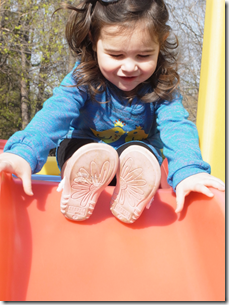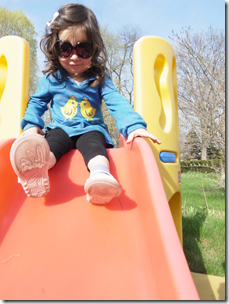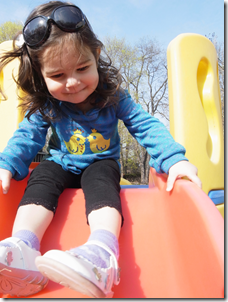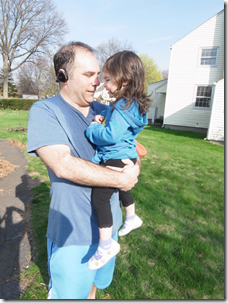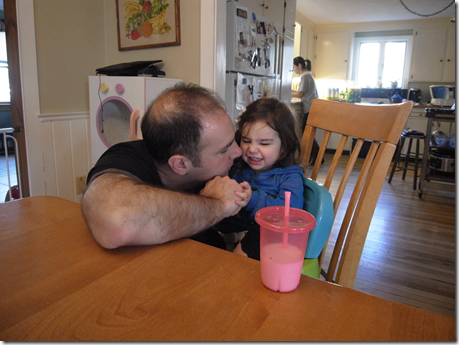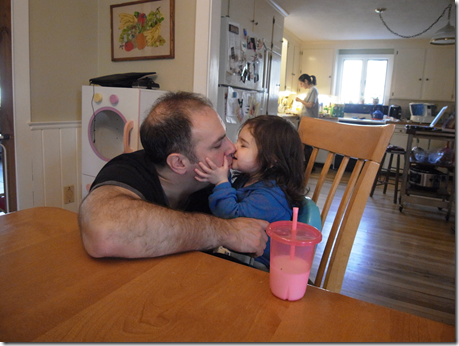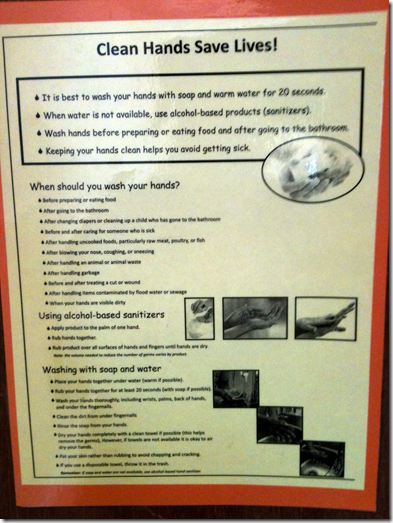Matthew Dicks's Blog, page 615
May 8, 2011
New favorites
My father-in-law, who has found a new career as a fashion photographer for my mother-in-law's eBay business, takes some of the best photos of my daughter, and this latest batch certainly holds to form.
May 7, 2011
Kiss of death
Worst thing you can say about a man:
He's a nice guy.
He has a good heart.
These are the default compliments assigned to the weak, the intellectually incapable and the otherwise ineffective.
They are almost always preceded by the word but.
"Yes, it's true. He never knows when to shut up, but he's got a good heart."
"He doesn't handle pressure well, but he's such a nice guy."
I can't remember the last time I heard either of these compliments used as anything but a counterbalance to criticism.
Maybe never.
And the winner is?
Weezer's first gig was opening for Keanu Reeves' band.
I'm not quite sure who should feel better about this.
May 6, 2011
There is only one appropriate and respectful time to host a toddlers birthday party and to say otherwise is just stupid and poopy
Blessed be the parents who schedule their toddlers birthday party for 10:00 AM on a Saturday morning.
There are so many good things about this decision, most specifically the respectful acknowledgement of the value of a day off.
Want to play golf in the morning?
No problem. Squeeze in 9 holes before you come over. There's no need to even be on time. This is a toddler's birthday party. Arrive at 11:00 and leave around noon. Your kid will never know the difference.
Want to preserve the majority of the day for yourself?
Great. Stop by around 10:00 and leave before noon. You still have the better part of the day to yourself, including the entire afternoon, and we've even sent you off with lunch in your bellies.
Your toddler is still napping regularly?
Good for you. Drop by for a couple hours, eat some cake and then bring your now-exhausted child home for a nap, probably right around his or her regular naptime.
Genius.
I'm not a fan of any toddler birthday party, and I generally try to avoid them at all costs.
But after experiencing the 10:00 AM birthday party firsthand last weekend, I can assure you that it is the only way to go.
It makes the toddler birthday party almost enjoyable.
What's the worst time for a toddler's birthday party?
Any time other than 10:00 AM.
Noon? You probably ruined somebody's afternoon nap, and by the time we leave, we've lost the better part of the afternoon.
2:00? You've now stolen the best part of the day, and you're still probably ruining someone's nap.
4:00? Now we're eating an early dinner with a dozen screaming, slightly poop smelling toddlers.
6:00? So much for any Saturday night plans.
10:00 AM people. Seriously. Anything else is just plain selfish and rude.
You can celebrate Bin Ladens death, but only if your celebration conforms to the celebratory bell curve
I first learned about the death of Osama Bin Laden on Twitter.
An hour later I watched the President speak on television.
Since then, I have listened to Americans react to his death, and I have listened to the reaction to the reaction.
I watched video footage of people outside the White House batting beach balls in the air while screaming in celebration.
I have read as people on Facebook and Twitter both celebrate the death of Bin Laden and condemn the euphoria over his death.
I witnessed a falsified Martin Luther King quote get passed around in what I can only assume to be a passive-aggressive attempt to chastise friends and fellow Americans for their outward exuberance over the death of the most wanted terrorist in the world.
If you are going to chastise someone, don't hide behind a quote to do it.
In the past few days I have heard much debate of the merits and morality of celebrating the death of another human being. I have heard people declare unequivocally that it is wrong to feel joy in your heart over the death of this most wanted man.
I have never been one for extreme emotional responses. Unless it is a sporting event, I tend to be even keeled, and even then, I tend to remain calm and introspective.
I threw a shoe through a wall when Desmond Howard ran back the opening kickoff to the second half of the 1996 Super Bowl, and I cried in 1996 when the Yankees won the World Series, but other than that outlying year, I tend to remain thoughtful and stoic in most circumstances.
When I first learned of Bin Laden's death, I was pleased that the United States military had succeeded in their mission without any loss of life.
I was happy that the families of 9/11 victims might find some closure with his death.
I was relieved that there would be no trial.
Was I happy that he was dead?
Perhaps.
But not enough to tote a beach ball to the streets and begin celebrating en masse.
But here's the thing:
Does anyone have the right to tell a person that they are wrong for feeling euphoric over the death of the man responsible for the largest attack on civilians in American history?
Should anyone be told not to celebrate?
Are we really in the business of telling people not to feel happy?
Actually, here's the thing:
We spend most of our childhood being told by teachers and parents to be ourselves. We are urged to avoid peer pressure, be ourselves, and don't follow the crowd. We are encouraged to find our own path in life and to be the person we were meant to be.
Then we follow this advice as adults, fail to adhere to the mean and are punished for it.
When a person posts their joy over Bin Laden's death on Facebook or take to the streets like people did at the conclusion of World War II, some of us suddenly feel the need to wag our fingers and tell them to stop.
To remind them that Bin Laden's death cannot bring back those lost on 9/11,
To preach to them about the perils of vengeance.
In short, we tell these people who are trying to be themselves and express their feelings to mitigate their emotional response, or at least conceal it behind a more somber and measured affect.
We urge them to conform to the mean using falsified quotations, Bible verses, blog posts and old fashioned name calling.
We tell them that there is a predetermined level of appropriate celebration and urge them to conform.
I hate this.
I was not one who was celebrated Osama Bin Laden's death with beach balls and chants of U.S.A.
I was more stoic and introspective about the news.
But I will also be the last person on the face of this Earth to tell a person to feel a certain way or falsify their emotional response in deference to the bell curve.
I learned the childhood lesson of being yourself quite well, and I refuse to punish anyone for following this advice.
May 5, 2011
Random thoughts on sneakers
I bought a new pair of sneakers last night, which led me to the following sneaker-related observations:
1. By the time a man is 40-years old, there is no further need to try on a pair of sneakers before purchasing.
A size 9 is a size 9 is a size 9.
If you think you need to try on a pair of sneakers to make sure they fit, you're just fooling yourself and wasting everyone's time.
2. By the time you can afford the coolest sneakers on the market, you no longer have any need for the coolest sneakers on the market.
Unless you are a douchebag, of course.
3. As a little kid, I liked shoe boxes more than the shoes that came inside. For someone who grew up poor, a shoe box had so many more uses than a shoe.
4. The coolest shoes I ever owned were pair of 1985 Air Jordans, purchased with the money earned from my first job as a farmhand on Jesse Deacon's horse farm.
I spent $110 for them, which remains the most I have ever paid for a pair of sneakers to this day.
[image error]
Too much information prior to peeing
This was the sign on the door of a restroom that I used today.
While the sentiment seems a little extreme (Wash your hand our die!), I was more concerned with the sheer amount of information that the sign contained.
Did the hand washing zealot who hung up this sign really expect people to stop at the restroom door and read the sign in its entirety?
All 28 bullet points?
Wouldn't the first four bullet points have been more than sufficient?
Wouldn't it be more likely for someone to stop and read just four bullet points as opposed to this treatise on hand washing?
Isn't this a case of less being more?
The most intriguing of the bullet points are the eleven under the heading "When should you wash your hands?"
What could the zealot have been thinking?
The person who actually takes the time to read this sign, in addition to being clinically insane, is about to use the restroom.
Does he or she really need to be warned about the importance of washing your hands prior to preparing food or handling uncooked poultry?
The purpose of the sign, I presume, is to remind people to wash their hands after using the restroom.
Shouldn't we save reminders about handling food, animal waste and sewage for a more relevant time?
A time when food, animal waste and sewage might come into play?
May 4, 2011
I have failed as a teacher
The birth of my daughter has made me a much better teacher.
Had you asked me prior to parenthood if this would be the case, I would have said that you were crazy.
It's so hard to know what you do not know.
Here's one way that I have become a better teacher as a result of my daughter:
Clara's preschool teacher loves her. It is clear through her words and deeds that she loves loves our daughter a great deal.
Perhaps as much as we do.
Her love is a gift to Clara, but it is also a gift to us. The knowledge that the person teaching your daughter is someone who loves her unconditionally is a remarkably powerful and reassuring thing.
It's one of the best things I know.
And it has left me thinking that although I love my students almost as much as I love my own child, I probably haven't done a good enough job conveying this sentiment to their parents.
I have failed to offer them the gift that Clara's teacher has given to us.
So now I know.
Now I know how to become a better teacher.
And I think it is a lesson than can only be truly understood by becoming a parent yourself.
All My Children and my mom
My memories of the time I spent with my mother during childhood are limited. I grew up in a small farm town in Massachusetts and spent most of my free time outdoors. Leave the house at 8:00, come back for a bologna and catsup sandwich at lunch, and then go back out until dinner at 6:00.
We didn't take any vacations and we didn't spend a lot of time as a family. For the most part, the kids did their thing and the adults did theirs.
My mom and I played a lot of videogames together for a period of three years, and when I was very young, we spent a great deal of time at horse shows, but otherwise I spent most of my childhood in the presence of children.
Brother, sisters and friends.
Memories with my mom are truly scant.
But there was one thing that we always had:
All My Children, the ABC soap opera.
In Blackstone, Massachusetts in 1975, kindergarten was a half day affair, and I was blessed with the morning half of the day. I came home on the bus around 12:30, ate lunch, and sat down in the living room to watch my mother's one and only soap opera, All My Children.
A questionable choice for a five year old boy, but my mom was never a big believer in conventional parenting.
And while kindergarten ended soon enough and half days become full school days, my mom would keep me updated on the All My Children universe for years later, filling me on on the latest news surrounding Erica Kane and a man named Adam who had a crazy secret twin brother hidden in a secret room of his mansion.
Sometimes in the summers I would even sit down with Mom and watch.
ABC announced last week that after 40 years, All My Children is coming to an end.
It's a sad reminder that no matter on inexorable something may seem, nothing lasts forever.
And while I have not watched or discussed or even thought about All My Children for years, its cancellation feels like another small piece of my mother has been chipped away.
My mom passed away four years ago, and the world has already changed in so many ways. This is just another change. A new iteration of the world with a little less of my mom included.
I sometimes wonder if she would even recognize it anymore.
And each time the world changes, I feel like the tangible reminders of my mother's existence fade away a little more, and that my grip on the memories of her fade as well.
Sometimes I wish everything would just slow down a little, and that the world that my mother grew up in and lived could last a little while longer.
May 3, 2011
Does knowing the author enhance the story?
I recently wrote:
A book talk places the author in the position of salesperson. He can sell the product or sell himself. I believe the latter to be always preferable.
I have always believed that if I can offer an audience some insight about my life and a few laughs along the way, they will be more likely to read my book and like my book than if I had spent my time touting the book itself.
As a result, my book talks and speaking engagements tend to be storytelling sessions that do not focus so much on my books as they do on my life.
But I've often wondered if this is the best way to sell a book. While my choice of strategy is hardly new, I have noted over the years that some of the more prolific and best selling authors spend a great deal of time reading from their books and talking about the stories themselves while revealing little about themselves.
As an reader and audience member, I've wondered:
Am I the only person who wants to know more about the author than the book he or she is hocking?
Last week NPR reported on a story that seems to support my position.
In an effort to get more attention for their band, record label Luaka Bop asked writer Chuck Klosterman to write a bio for the band Delicate Steve sight unseen.
The label's President, Yale Evelev, wanted something different that would grab the music industries attention and get people to actually read it.
"I thought, since I'm really tired of bios for bands, wouldn't it be great just to tell Chuck to write whatever the hell he wanted as a bio for the band? So I wrote him an email and I said, 'Chuck, would you do a bio for Delicate Steve? You don't have to talk to the band and you don't even have to hear the record.' He wrote me back: 'I don't do bios.' And then, two minutes later, he wrote back again: 'Wait a minute. Do you mean I don't have to talk to the band or listen to the record? That's AWESOME! OK, I'll do it!'"
And it worked. NPR reporter Franne Kelley received the press release, noted the unusual bio of the band, and decided to check out the band.
The result was this story, which garnered Delicate Steve a great deal of free publicity.
Kelley writes:
"One of the reasons Klosterman was able to pull this off in the first place is that we NEED stories about music, and those stories really do change how we hear the music."
And the research backs up her claim.
Michael Beckerman, chair of the music department at NYU, has done research on this very subject.
From the NPR story:
Five years ago, he invited a group of people to listen to a piece of music in a church in Germany. He gave program notes to half of the audience that told them the piece they were about to hear was written in a concentration camp, by a composer who was sent to Auschwitz only days later, where he died. He told the other half nothing other than the composer's name.
"Afterwards," Beckerman says, "we interviewed everybody. And the people who didn't get program notes thought it was sort of a sweet, lovely, folksy, Eastern European piece. And the people who got program notes almost uniformly tended to understand it at as one of the great tragic statements of the century."
It would seem that knowledge of a piece of music changes the listeners opinion of it.
I would argue that the same holds true for books. Knowing the author changes the way that a reader views a story.
And liking the author as a person will go a long way in helping a reader enjoy a book.
I was recently participating in an online discussion about my first book, SOMETHING MISSING. A book rep for a major publisher was hosting the chat, and while she initially liked it a great deal when it was published in 2009, she admitted that knowing me personally has changed the way she views my work.
I assume it changed for the better, but I was afraid to ask.
But the same has held true for me. In the three years since I published SOMETHING MISSING, I have met a great many authors and gotten to know a few very well. And in each instance, I have found that the way in which I read their work has changed as I have gotten to know them on a more personal level. When I know an author, his or her books tend to take on more subtlety and nuance, and I am better able to detect those connections that the novels make to the real world.
And in every instance, I find myself liking the book more.
But I still wonder if I am in the minority. When I am delivering a book talk, should I be pitching product or person?
In two weeks I will be speaking at the Connecticut Literary Festival, and while I rarely know what I will say before approaching the podium and often change my mind midstream, I will invariably begin telling stories about my life. It's what I have always done, and frankly, it's what I enjoy most.
And halfway through the talk, I will have to remind myself to mention my books, because my instinct will be to push them aside and use my time to allow my audience to get to know me.
If they know me and like me and become interested in my life story, how could they not want to read my books?
Right?
Or wrong?

